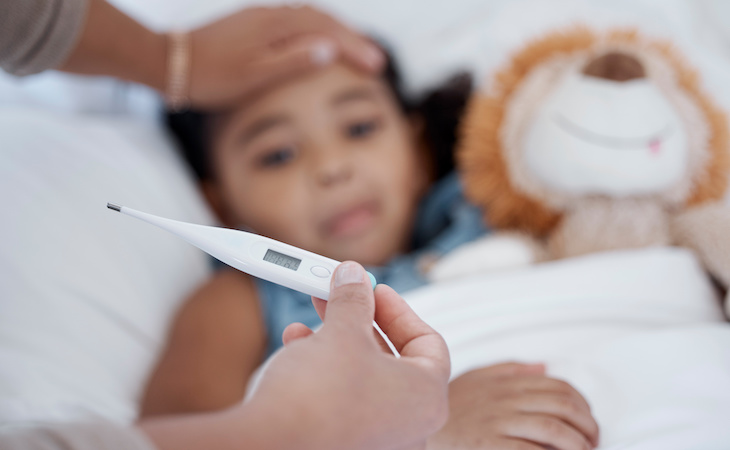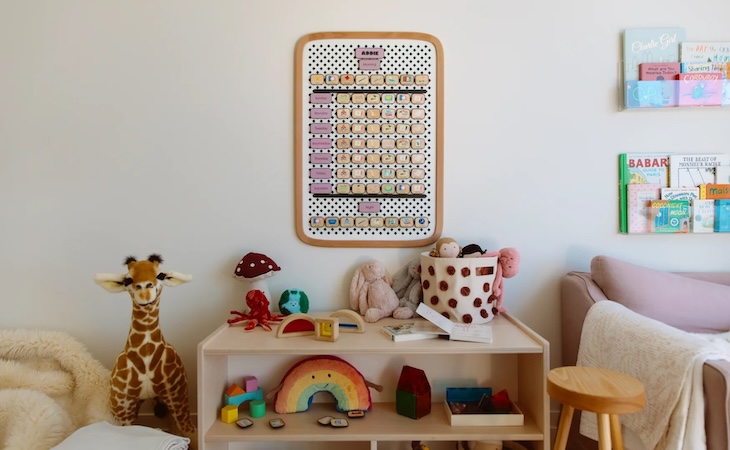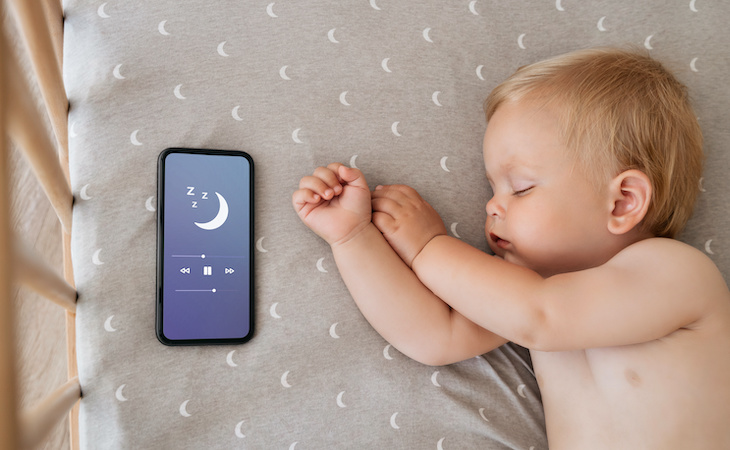Although spring is right around the corner, wintertime illnesses aren’t showing signs of letting up just yet. According to the Centers for Disease Control and Prevention, there’s been a recent increase in cases of the norovirus with positive tests hovering at 16% in recent weeks. Plus, just a few months ago, there were significant spikes in strep and RSV cases so much that experts deemed we were in a “tripledemic.”
Unfortunately, the brunt of those illnesses is largely felt by parents of young children, who have developing immune systems. That means if one or several children are sick, parents may also become sick and it becomes more difficult for everyone to get a good night’s rest.
Below, we asked experts to share a few tips on how to manage sick symptoms at night to help ensure everyone in your family—parents included—get the rest they need.
How to help a sick kid sleep better
1. Clear stuffy noses with a nasal aspirator
A child who can breathe better at night is going to sleep better. If your child or baby is dealing with an upper respiratory infection or virus that’s causing lots of congestion, you can help clear up some of the mucous, and boogers, with a suction bulb or snot sucker, says Ashanti Woods, MD, a pediatrician at Mercy Medical Center in Baltimore, Md. You can add a few drops of a nasal saline solution to help loosen up and thin out sticky snot and soothe dry and irritated nasal passages.
2. Invest in a good humidifier to moisten the air
Humidifiers help moisten dry air in a room, especially in heavily heated spaces, which can make it more difficult to breathe. By moistening the air, they can help thin out mucous.
“I say it makes the air nice and juicy and easier to breathe,” says Woods. “It mimics when we all step out of a shower in the bathroom. That humidity in the bathroom feels good.”
3. Use a fever reducer
If your child is running a fever, give them a dose of acetaminophen (Tylenol) or ibuprofen (Motrin) before bed, Woods suggests. High temperatures are considered a fever if they are 100.4 or greater, so make sure to check your kid’s or baby’s temperature regularly when they’re sick and give them the age-appropriate dosage, per your pediatrician’s recommendation.
“Often what happens is we might forget that step, so the child wakes up in the middle of the night feeling uncomfortable, and now we got the whole family waking up,” Woods says.
4. Tame a bad cough with honey
Pediatricians strongly advise against using cough medicines for children under the age of 6 because there’s little evidence they work consistently before this age and the side effects of these medications can be harmful to young children, Woods notes. That said, there are some non-medicated, over-the-counter cough syrups for infants and young children, which are made with honey or agave. Note that honey-based, non-medicated cough syrups are recommended only for children who are at least 12 months.
“Honey is the only proven treatment,” says Elena Shea, MD, a pediatrician at Farrell Pediatrics in Resto, Va. “Studies show that a half teaspoon of honey before bed can help a cough and thin mucous. Other over-the-counter treatments have not been studied in children and have not proven effective when researched in adults.”
According to a 2018 review in Cochrane, honey helped relieve cough symptoms, including reducing the duration, frequency, and severity of cough, in children ages 12 months to 16 years.
If your child is older than 6 years old, you can speak to your pediatrician about introducing a decongestant or cough medicine.
5. Talk to your pediatrician about using a nebulizer
Parents who have asthma may be wondering if they can offer their nebulizer, which is a machine that turns liquid medicine into a mist, per the U.S. Library of Medicine. Although you should never share the same medications prescribed for you with your children, you may use a non-medicated nasal saline solution in a nebulizer to help your child breathe easier, Woods says. Just make sure to speak with your pediatrician first.
As mentioned, applying a nasal saline solution can help thin thick mucous and dislodge boogers that are clogging your child’s nasal airways.
6. Add a methol-scented solution or oil to your humidifier
Menthol-based lotions and balms aren’t recommended for children younger than 12 months because they pose a risk for inhalation injury and can cause skin irritation, Woods explains. However, if you have a humidifier, you can consider adding a few drops of a menthol solution or a menthol-scented oil to the water, he says.
You can also look for vapor rubs that don’t contain menthol. There are over-the-counter formulations for toddlers that are safe as long as there isn’t any menthol, Shea says. For example, there are some infant and toddler chest rubs formulated with aloe, eucalyptus, and lavender oil. You can apply some of the menthol-free balm to your baby’s chest.
How to sleep better when the whole family is sick
1. Stay hydrated
When your entire family is sick, including yourself, it can be challenging to muster up homemade meals—especially when you have low energy and your kids may not have much of an appetite. The most important thing you can do for yourself and your family is to make sure everyone is hydrated.
“We recommend making sure babies are drinking regularly, whatever fluid they like,” Shea says. “As for meals, if babies are not hungry, that can be normal. I do not recommend forcing sick kids to eat. Again what is important is hydration. Chicken noodle soup has been proven to help with hydrating and helping babies and children feel better.”
A 2000 study in Chest found that chicken soup contains a variety of substances from the chicken itself, vegetables, and herbs that can help fight inflammation from a cold and ease symptoms from an upper respiratory infection.
Not really feeling up to cooking? Lean into convenience foods or order takeout. Do whatever you have to do to make it through the day.
2. Ask for help from family and close friends
Parents can’t fill from an empty cup, so if you’re feeling drained, this is the perfect time to call on family and friends for help. If you have family members, close friends, or a nanny or babysitter who doesn’t mind caring for sick kids, you can ask them to come over for a few hours during the day so you can take a nap while they take the kids outside for a walk or play with them inside.
“Try to focus on what you can do,” Shea says. “Focus on keeping yourself and your kids hydrated and comfortable. Let all other things go for now. If you have someone who can help (family, friends, nanny) call them in for help. When all are sick, it’s survival mode until everyone is feeling better.”
If you have a partner, make sure you share the load of caring for the kids. Relying on one parent to do all the childcare while everyone is sick often leads to burnout and resentment. Have a conversation with your partner about what they can do to help you and be direct with your needs. If one parent is sick and the other isn’t, try to sleep in separate beds at night to help prevent illness from spreading.
3. Ask for flexibility at work
Whether you work from home or at the office, it can feel impossible to get all the things on your to-do list checked off while caring for a sick household and recovering yourself. The best thing you can do to help relieve some of that stress is to voice to your team at work about what’s going on at home and be realistic with your current bandwidth. You may have to postpone deadlines and cancel meetings, and that’s OK. This will help ensure you get enough rest at night instead of working late into the evening just to make up for lost time at the office.
FAQs
Why do kids not sleep when they’re sick?
Kids might find it difficult to sleep well at night when they’re sick because they’re congested and can’t breathe well or they feel uncomfortable with a fever. They may also cough throughout the night if they have a sore throat or experience ear pain if they have an ear infection.
Do kids need extra sleep when sick?
It’s normal for kids to sleep more or feel more tired when they’re sick, but when they’re awake, they should be alert, according to Seattle Children’s Hospital. If you’re having a hard time waking your child up or they’re too weak to cry and don’t respond to you, it’s considered an emergency and you should call 911.
How can I help my child with a cold sleep better?
You can help your child get a better night of sleep by treating their symptoms as best you can. For example, you can turn on a humidifier in their bedroom to moisten the air, which will help relieve congestion. Using a nasal aspirator with a nasal saline solution can also help clear up and thin out thick mucous.
If your child has a fever, you can give them an age-appropriate dose of a fever reducer, such as acetaminophen or ibuprofen. Children under 6 years old who have a bad cough may find some relief with a honey-based non-medicated cough syrup. Note that honey isn’t recommended for children under 12 months.
Is melatonin safe for children? Here’s what you need to know about giving kids melatonin for sleep.




